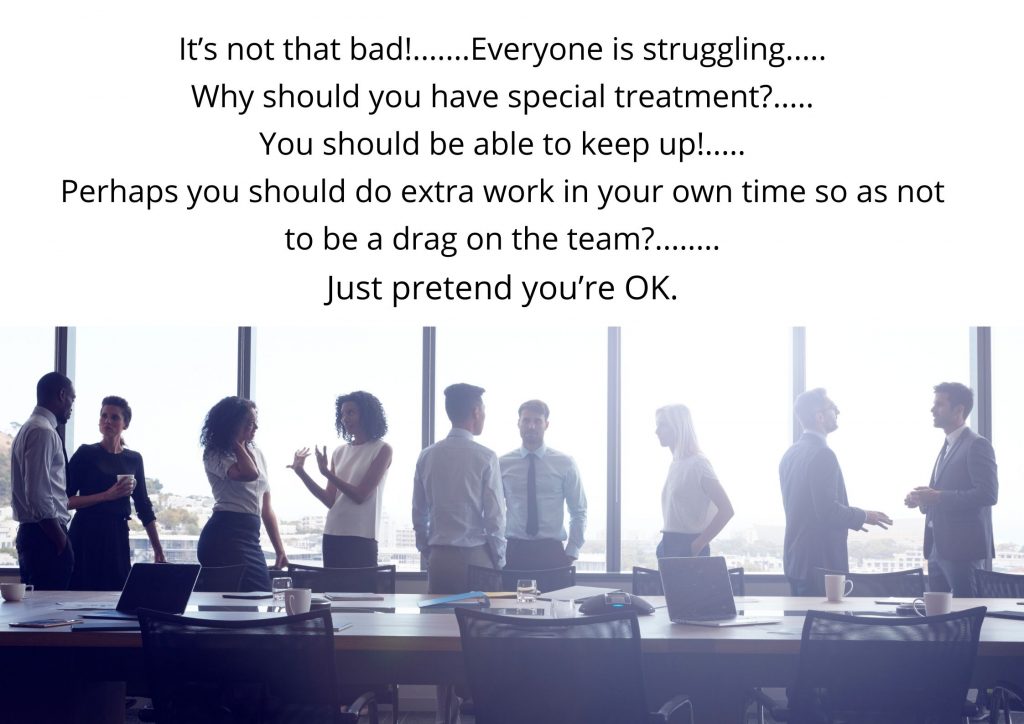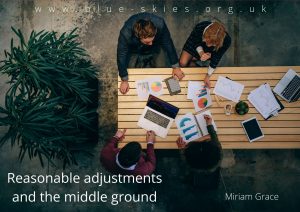 It struck me today when I was in a meeting discussing work adjustments for colleagues with childcare responsibilities during lockdown, that maybe we all need ‘reasonable adjustments’ right now.
It struck me today when I was in a meeting discussing work adjustments for colleagues with childcare responsibilities during lockdown, that maybe we all need ‘reasonable adjustments’ right now.
It was an unusual perspective for me as a disabled person to not be the one asking for reasonable adjustment, and to watch as a colleague discussed what they could previously do and how they were unable to do it at the moment and to explore options.
As I observed the emotional journey, the process of sadness, frustration, shame, guilt, acceptance, assertiveness, and then finally the paranoia (something that a person with disabilities might feel about others wondering why we get “special treatment“), resonating with it myself, I thought about the discussions we go through internally as we acknowledge our needs to ourselves and then make adjustments to support ourselves. What sort of a manager of ourselves are we?

These are unthinkable things to say to someone who works with you, or for you, but do you ever say these things to yourself?
Tell me, what would a good manager say to you during the coronavirus pandemic? Might they say…

Between Catastrophic Escalation and Polite Socialisation
This brings us into the middle ground. Where we are competent yet tired; experienced yet stressed, productive yet distracted. We are currently in lockdown in the middle of a pandemic with additional worries to our usual ones. Existing injustices may seem exacerbated and usual support may seem more remote. Yet all is not lost and we are not completely alone.
“How are you?“ we ask each other (and we can ask ourselves).
At one end of the spectrum we have, “I am fine“, at the other end we have, “the sky is falling in!“
It is rare that either of these is true.
We aren’t fine and the sky is not falling in.
The middle ground is our place in-between these two positions.
To find the middle ground we need to pause so that our fight / flight and anxious response doesn’t answer for us in catastrophic escalation and so that our socialised conditioning about putting a good face on things doesn’t answer for us either as this won’t help us be aware of what is necessary to adjust.
It does others a disservice to present in an unrealistic way as they may feel isolated, or encouraged to hide their own struggles. We don’t need to lay it on thick either, we aren’t powerless, we aren’t useless, we can be constructive, strong and creative in how we adjust. People who live with disability are already skilled at exploring the parameters of shame and relief, of honest self-appraisal and clear communication of need.
Maybe it’s time to turn away from any resentments, and jealousy of others having help, and to turn towards ourselves and discover what our needs are, what adjustments would help us. I believe resentful feelings to be misplaced anger about living in a grossly unfair world where our own needs haven’t been met. Whether it’s workplace dialogue or internal dialogue, let’s look at our own issues instead.
Next time someone asks how you are …allow the pause to take you to the middle ground
Honesty and truth are essential, as I addressed in my recent article. To achieve honesty we need to know our truth. To know our truth we need to stop and pause and listen kindly and compassionately to ourselves with wisdom and self knowledge.
Next time someone asks how you are, stop, take a sip of water, allow yourself to connect with your truth, which is probably somewhere in the middle ground. Allow the pause to take you to the middle ground. Then answer with honesty.
Today’s Practice:
• Practise the pause, ask your body, your breath, your heart rate what is needed. Ask your mood, your heartache, your worry what adjustments you can make to help yourself.
• Assess your own needs, gently find your middle ground.
• Make a reasonable adjustment for yourself. Take responsibility for your ‘work conditions’, and be a good manager.

- Reasonable Adjustment is a U.K. term for the legal right of people with disabilities to have adjustments made for them at work so they can do their job. It is part of equal access policy.
Currently due to lockdown the idea is sometimes being used to help those who are having to work and simultaneously home-school children.
I really like this concept Miriam and very appropriate at the moment when we are facing so many different demands.
Thank you so much, Ellen. It’s obvious when it applies to someone else, but we sometimes forget to apply these reasonable adjustments to ourselves! Glad you found it a helpful reminder.